It is hard to believe that there were people who had no qualms about earning money on the blood and tears of their own nation. And it does not comfort at all that usually their fortune turned out to be extremely fragile ...
The Office for Fighting Usury and Speculation (the so-called "Trzynastka") gathered the greatest crooks in the Warsaw Ghetto. Despite the noble name, he did exactly what he should fight. Informing, smuggling, bribery and blackmail - these are just some of his sins. And all under the control of "editor" Abraham Gancwajch.
Acquaintances with the director of propaganda Wilhelm Ohlenbusch and unwavering allegiance to the German occupier made Gancwajch a special privilege. He did not have to wear an armband with the Star of David, and the road to the Aryan part of the city was open to him.
Plus, could make really big money . He was in charge of over a hundred houses, a poster office, several factories, and a host of other smaller businesses. No wonder then that you didn't eat and drink anywhere like that as at ceremonial dinners at Gancwajch's, to which he invited the greatest celebrities of the Warsaw Ghetto.
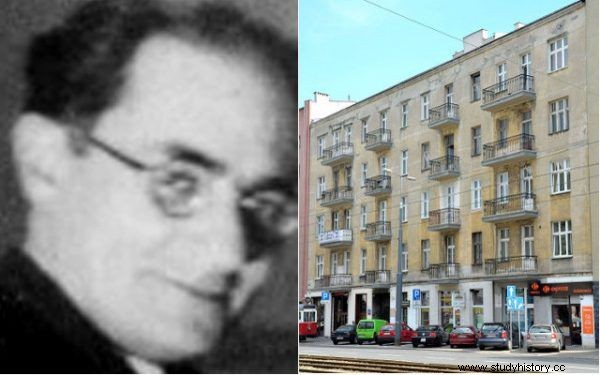
Abraham Gancwajch (on the left, author of the photo:unknown, source:public domain) managed the Office for Fighting Usury and Speculation, which was located in a tenement house at today's al. Solidarności (author:Adrian Grycuk, license:CC BY-SA 3.0 pl).
Anyway, who forbids the rich. When thousands of people were starving, Gancwajch with great pomp organized his son's bar mitzvah at the New Azazel Theater which ended with the distribution of coffee and bread to the poor. As one of the witnesses says: it must have cost him a fortune .
Wait a minute ... Bread for the poor? It boasts! Not necessarily. Gancwajch was a master in creating (or rather doubling existing) institutions which, apart from a positive-sounding name, did not have much to offer. Let's take the Jewish Ambulance Service. Maybe it had its own ambulance, but what if it was used mainly for smuggling goods.
As one of the witnesses wrote: The poor horse was bending under the weight of the contraband goods that were in a locked car. What about the bread being given away? It is quite possible that he had previously been commandeered from a baker as a punishment for illegal baking. Such sourcing of goods was not uncommon back then.
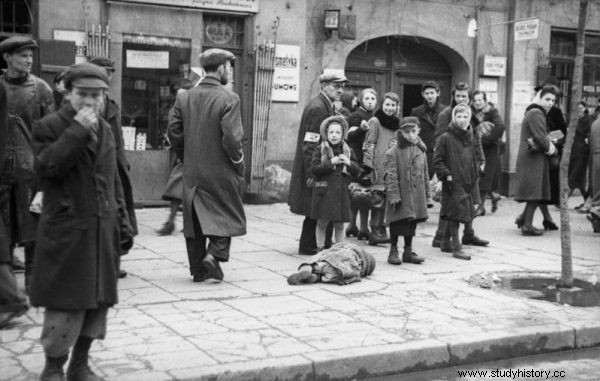
People were starving in the streets of the ghetto, and Abraham Gancwajch organized his son a sumptuous bar mitzvah! (source:Bundesarchiv, license CC BY-SA 3.0 de).
Gancwajch, who believed that only cooperation with Germany could bring salvation to his nation , he found out firsthand about the true intentions of the Nazis. While after the dissolution of "Trzynastka" on August 5, 1941, he continued to run his businesses, with time his good streak ended. Wanted by the Germans, he was hiding on the Aryan side. He was probably shot in Pawiak in 1943.
Hotel Polski affair
Thirteen attracted people who wanted to try a happy life - as one of the ghetto inhabitants put it. However, officials they had to be careful, because neither the Polish Underground State nor the Jewish underground organizations were going to tolerate the unbridled life of collaborators.
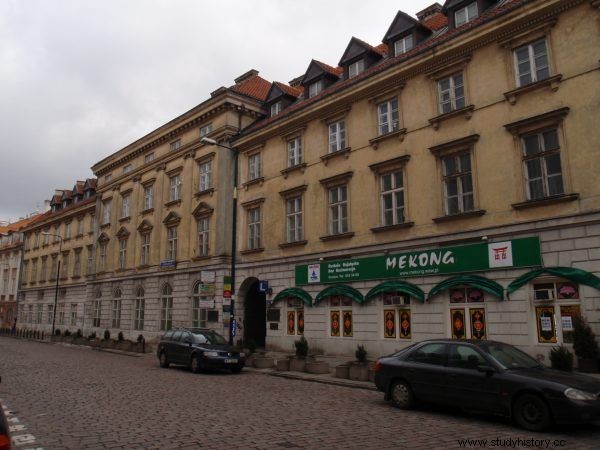
Here, at the Hotel Polski at ul. Długa, the unfortunate victims of Skosowski's "Lolek" scam (author:Mzungu, license:GFDL) were interned.
Leon "Lolek" Skosowski saw it the hard way. This simple textile technique from Łódź, behind the ghetto walls, turned into one of the most devoted activists of "Trzynastka" and Żagwia. His collaboration was so disgusting that he was hunted by all underground organizations . On February 21, 1943, he was shot, but after healed his wounds, he quickly resumed his activities.
He made the greatest fortune in the "Hotel Polski" scandal. According to the efforts of diplomats and other personalities from Switzerland and the USA, some Jews from the Warsaw ghetto were allowed to send their passports so that they could emigrate to South America. The documents sent at the turn of 1942 and 1943 did not find their way to their owners, but to Skosowski and his companion Adam Żurawin. They couldn't pass up such an opportunity.
This article has more than one page. Please select another one below to continue reading.Attention! You are not on the first page of the article. If you want to read from the beginning click here.
They sold passports to Jews in hiding, the price of which reached as much as PLN 300,000 apiece. However, there was no shortage of people willing. Jews who managed to buy a passport were interned at the Polski Hotel on Długa Street in Warsaw. The entire venture seemed plausible. Eventually, the internees included representatives of the Jewish resistance movement as well as collaborators (including Gancwajch's wife).
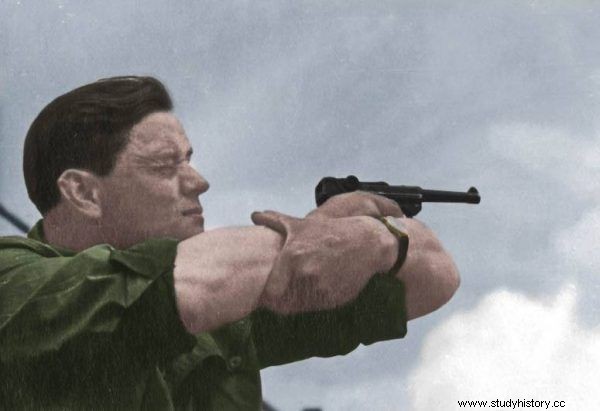
All underground organizations hunted Skosowski. Illustrative photo from the "Great Book of the Home Army" (Znak Horyzont 2015). Colorization:Rafał Kuzak
However, the Germans realized that they were dealing with a fraud. They began to carefully check the documents and all who did not have their passports were shot. And Skosowski? He drank in luxury, sparing himself no alcohol and the company of prostitutes. Fortunately, not for long. He died at the hands of the Home Army on November 1, 1943. Anyway, the very history of this execution is material for another article.
Spira's Symche and his odemans
The Jewish Order Service (Jüdischer Ordnungsdienst) was an institution that made a particularly dirty mark in the history of the Holocaust. In the "Ringelblum Archive" it is directly referred to as an enterprise. It is true that she was called to keep order in the ghettos, but in fact became the hands, ears and eyes of the Gestapo .
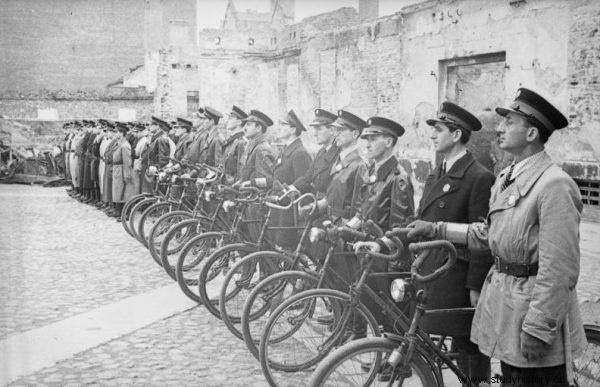
Jewish policemen in the Warsaw ghetto, photographed in May 1941 (author:Ludwig Knobloch, source:Bundesarchiv, license:CC BY-SA 3.0 de).
Symche Spira was a particularly disgusting figure in the Krakow ghetto. This pre-war glazier, megalomaniac and fantastical, classic example of a psychopath, neurasthenic, liverwort, subject to frequent attacks of urolithiasis, erotomaniac, looking for new and easy love adventures, half illiterate, speaking Polish badly and German equally bad he was disgusted with his obedience to the Germans.
Both Spira and other odemans - not only from the Krakow ghetto - knew perfectly well that the high position in the ghetto and the connections it entailed open the pockets of other Jews. As Aleksander Bieberstein wrote: OD-men enjoyed abundance. Managers in particular, bribed large wealth . In the Krakow ghetto, brothers Michał and Ignacy Pacanewicz enjoyed a particularly bad reputation - greedy and corrupt, they made their fortunes in a dishonorable way.
The Jewish policemen were convinced that by collaborating with the Germans, they would save their skin. Nothing could be further from the truth, Symche Spira died in the Płaszów camp. Not long after he himself sent people to their deaths.
Spend your parents and I'll buy you a blowjob
There is one more figure connected with the history of Krakow Jews. It's Stefania Brandstätter, who had a weakness for Gestapo uniforms from the beginning of the war . She was especially fond of commander Rudolf Körner, who was a regular visitor to her apartment.
She cared very much for her lover, and when too loud conversations came from the neighbor's apartment, she was able to jump in and say without shame that the commander is in her apartment at the moment and after hard work (author's emphasis) resting . That is why the loud neighbors should disperse, otherwise they will see what Oświęcim is .
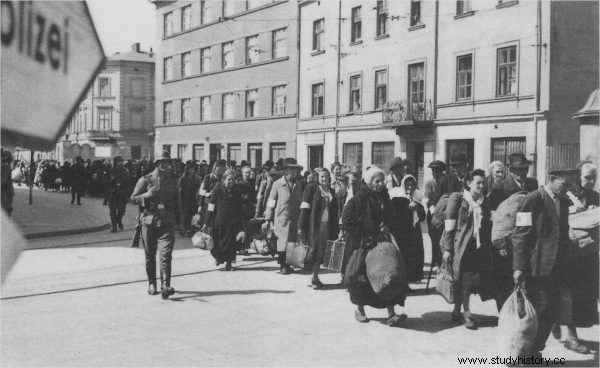
Stefania Brandstätter's suffering was of no concern to others. The photo shows the liquidation of the Krakow ghetto (author:unknown, source:public domain).
Brandstätter could never complain of poverty. Her friend from the school bench, Zofia Weindling, recalls how Stefania boasted about her valuables and contacts, more than once inviting her to expensive restaurants. After the arrest of Izabela Czecz, who had the misfortune to be the admonished neighbor, Brandstätter took her apartment with all the furnishings, not forgetting the furs of course. But who would be satisfied with such scraps! She also went to Izabela's mother and demanded 50,000 zlotys in exchange for her daughter's release.
But that's still nothing. She could roam Planty in search of Jewish children which were stored on the Aryan side. When she found a toddler with a Semitic appearance, she asked him about his parents, bribing him with sweets. The unexpected child revealed the addresses of the real parents. And then Brandstätter went into action, either denouncing the Gestapo or blackmailing the victims.
This article has more than one page. Please select another one below to continue reading.Attention! You are not on the first page of the article. If you want to read from the beginning click here.
Undisturbed by nothing, she lived to a quiet old age. In 1944, Kröner helped her get to Hungary, from where she emigrated to New York. There she probably took the surname of her new husband.
Don't mess with the barber
The Cracow ghetto was shaken by a glazier, and the Lublin ghetto by a hairdresser. Thanks to the efficient movement of scissors, Szama Grajer was quickly released from the German prison at the Lublin Castle. It so happened that the dignitaries who used his services saw in him excellent material for a Gestapo informant . Indeed, he was second to none in the haircut of his own countrymen.
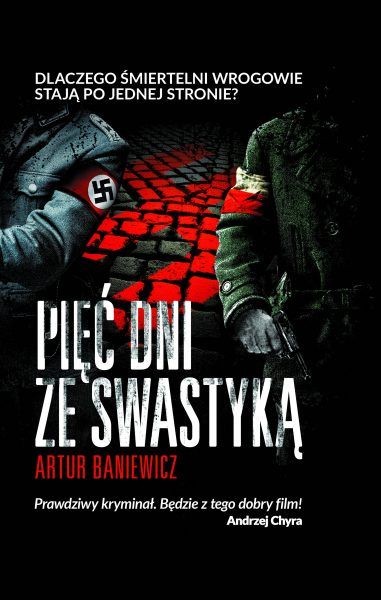
The article was inspired by the latest novel by Artur Baniewicz, "Five days with a swastika", which has just been published by Znak Horyzont. Here you can buy it 30% cheaper!
As we read in one of the reports, Grajer after being released from prison, he became a "macher", traitor and slanderer . He served the Germans by showing them where the Jews were hiding their goods. He informed who did what, who did not work, who hid their belongings, etc. He sent people to prison and they paid him for it. Then he tried to release his victims from custody and the families were paying for it again.
The Germans, of course, appreciated the informer's efforts, granting him many privileges. One of them was the opening of a restaurant. It featured a very specific social mix that was made up of prostitutes with their pimps, SS men and Jewish elites.
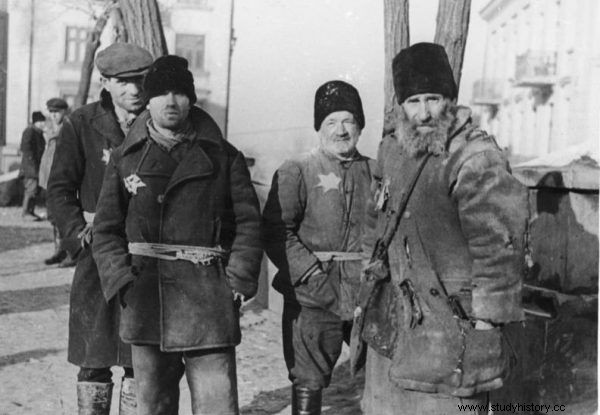
Szama Grajew lived on a level that other Lublin Jews could only dream of at the time. But was it worth falling so low for the money? (source:Bundesarchiv, license:CC BY-SA 3.0 de).
The latter did not appear at Grajer on their own accord. The collaborator was able to accost passers-by and force their presence in the premises . And I must admit that Grajer's question Won't you have a drink with me? was an offer that could not be refused. That's why everyone was drinking. Even abstainers.
After the ghetto was moved to Majdan Tatarski, Grajer lost himself even more in his pigs. He opened another restaurant to which he again invited the richest Jews. One evening, when the guests were seated comfortably, he announced to them that they owed him a large sum of money . Some even heard that as much as PLN 20,000!
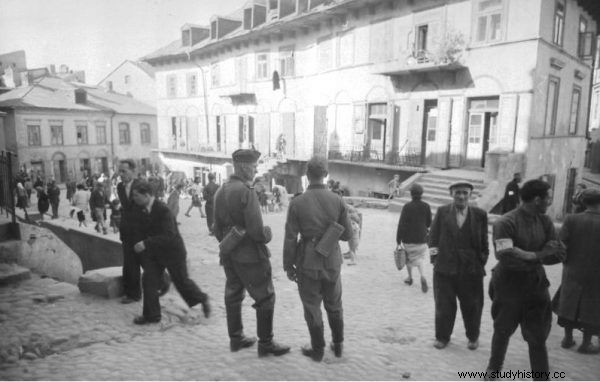
In his restaurant in the Lublin ghetto, the former hairdresser liked to play God (author:Johannes Hähle, source:Bundesarchiv, license:CC BY-SA 3.0 de).
Of course, no one ever borrowed any money. But also no one was going to delay the payment of "debt". Apart from that, Grajer is particularly fond of a certain sadistic game. He was walking around his place, pointing his whip at one of the guests and shouting: Buddy, get up! It was nothing but an official pronouncement of the death sentence.
During the liquidation of the ghetto in Majdan Tatarski, it was Grajer who heard "Get up". He was arrested by the SS and then shot. He was not helped by the excellent relationship with the officers who were provided with alcohol and prostitutes. For the Germans, he was only a Jew. However, for the ghetto inhabitants - unfortunately a Jew.
